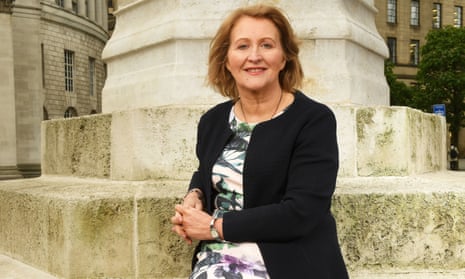The children’s commissioner for England has said the risks faced by deprived young people are “the biggest social justice challenge of our time”, after publishing research that suggests one in six minors live in families affected by parental addiction, mental illness or domestic violence.
Anne Longfield said that of the estimated 2.1 million children in England in vulnerable family situations, as many as 1.6 million were “invisible” to a social support system that effectively ignored them until their problems escalated to crisis point, at which they risked being taken into care.
“I am increasingly frustrated by the number of vulnerable children who cannot meet their own ambitions because they are let down by a system that doesn’t recognise or support them,” Longfield said.
About 825,000 children under the age of 18 live with an adult who has experienced domestic violence in the past year, the research calculates, 470,000 live with an adult who is dependent on drink or drugs and 890,000 live with a parent who has severe mental health problems.
An estimated 103,000 children, including 52,000 under-fives, live with an adult with what is known as the “toxic trio”, meaning they carry the burden of all three risk issues simultaneously.
Longfield said the government had a moral and economic imperative to invest in so-called early intervention services, from psychological counselling to youth clubs, that could help at-risk young people overcome challenges and give them the best chance in life possible.
“The social, educational and economic costs of failing to help these children are clear,” she said. “However, beyond all of this is a moral argument about whether we are prepared to deny children who need our support … I believe that supporting vulnerable children is the biggest social justice challenge of our time.“I don’t pretend that meeting this challenge will be easy or that it can be done for free. It will require additional resources. But more than that, it requires a paradigm shift in our approach to children so that we move from a system which marginalises vulnerable children to one which embraces them.”
A child would not necessarily have a poor life because they were identified as being exposed to high levels of risk, she said. “For a good proportion of these children, the support of families and and a good experience in school will be enough to ensure they have happy and fulfilled childhood, despite adversity.”
About 570,000 children receive support through children’s social care or the troubled families programme, meaning that up to 1.6 million get no known structured help outside of a “patchwork provision” involving their family and/or community and voluntary services.
The researchers admit there are “substantial weaknesses” in the data, drawn from statistics and surveys compiled by various government agencies and departments, but insist they are conservative estimates that provide “the best available ballpark figures” of child vulnerability.
Government spending on early intervention services for children through local authorities has been reduced by 60% since 2010. The research says investing in these services is cost-effective compared with the expense of putting a child into care, which can be as much as £55,000 a year.
Local authorities have said there is a growing crisis in children’s social care caused by increasing numbers of children being taken into care or made subject to child protection plans as a result of the failure to provide early support for families.
Javed Khan, chief executive of the children’s charity Barnardo’s, said: “These shocking figures bring home the impact of domestic abuse on children. We know from our specialist services that they are victims and not just witnesses, even if abuse and violence isn’t aimed directly at them.”
Imran Hussain, the director of policy and campaigns at Action for Children, said: “It’s our most vulnerable children who are paying the price for the punishing central government cuts to council budgets and being left without the early help they desperately need.”
